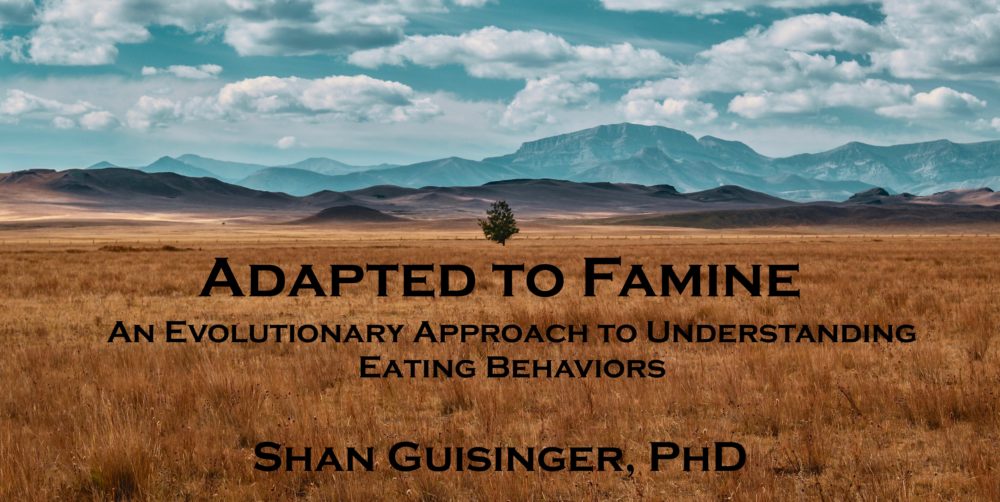Thin Theory
by Maia Szalavitz
ELLE Magazine | June, 2004
Is anorexia all in its sufferers’ heads? One psychologist theorizes that it may be an ancient survival instinct gone awry in our modern culture of plenty.
For years we’ve been fed psychological theories about anorexia: It’s a hunger strike against controlling parents; it’s the ultimate capitulation to cultural commandments to be thin; it’s a disease of perfectionism abetted by unattainable images of whippet-thin models. But a new theory about the disorder suggests it may be biological, a remnant of evolutionary history that helped some women flee famine.
Shan Guisinger, PhD, a Montana psychologist, recently published this hypothesis in the journal Psychological Review after noticing that many anorexics – 90 percent of whom are female – desperately wanted to recover, despite the clinical definition of the disorder as a “refusal” to maintain a healthy body weight. “It felt biological to me,” she says. Guisinger, who has a master’s degree in zoology from Colorado State University, considered whether there could be an environment in which it made sense for a starving animal not to eat. She found that many animals stop eating to focus on a more important task – be it incubating, migrating, or defending a harem – despite extreme weight loss. Also, research shows that if rats are forced to lose 30 percent of their normal weight, they will run frantically on an exercise wheel and ignore food. Intriguingly, this phenomenon develops faster in female animals.
Unlike involuntary starvation, anorexia leads to periods of hyperactivity, Guisinger says, accompanied by a feeling of being on a mission: “There is this sense of superiority, of virtue – a humorless quality.” In her paper, she describes how such a mechanism could enable women to escape death, giving them the energy and tenacity to travel beyond the famine-stricken region. When a woman reached a food-rich region, she would become hungry, settle, and eat.
As for why today’s anorexics don’t recommence eating, Guisinger says that while they do tend to lose their appetite for much of their illness, they often experience a period of great hunger, typically late in recovery. But because our culture has made them so frightened of becoming fat, rather than yield they often redouble their dieting and exercise. She also accounts for why women would suffer from the disorder disproportionately: Men wouldn’t benefit as much from a famine-flight strategy. In nature, males who try to enter the territories of others are attacked, while females are usually welcomed.
Guisinger’s theory is bolstered by other research. Studies now find that anorexia is, at least in part, genetic, with identical twins much more likely to share the condition than fraternals. There is also evidence than anorexics have conflicting levels of appetite-regulating substances in their brains and stomachs. Their brains’ levels of the neurotransmitters serotonin, dopamine, and norepinephrine are the opposite of what they should be to signal a craving for food. At the same time, their stomachs send out mixed messages, retelling the brain they are full and hungry simultaneously. Essentially, “this means that the person with anorexia is tormented by desire for food she cannot bring herself to eat,” Guisinger says. This odd chemical imbalance could be the biological signature of a need to seek food but not eat it.
In industrialized nations, only compulsively driven perfectionists and those with wasting illnesses would be able to starve enough to activate this mechanism in the first place. And indeed, anorexia sometimes starts when another disease causes dramatic weight loss, Guisinger says.
Her theory suggests that current treatments focused on perfectionism or family dysfunction are misguided. Perfectionism may start the disease process, but then biology takes over. Research shows that one new therapy that’s been proven effective teaches those closest to the anorexic to help her to eat – even in adult anorexics, this is usually the mother – and it’s easier to engage mothers in therapy that doesn’t blame them. “Theories on schizophrenia once blamed the ‘schizophrenogenic’ mother….With anorexia, controlling mothers are still the culprit,” says Guisinger, who hopes her ideas will end this view.
But the eating disorder-treatment community – many of whom have spent years working on the assumptions of the perfectionism theory – has responded coolly. William Davis, PhD, the vice president of research and program development of the respected Renfrew Center for eating-disorder treatment, agrees that anorexia is not caused by intrusive parents but thinks that Guisinger’s theory is “irrelevant to clinical practice – it has nothing to do with an anorexic’s experience of herself.”
Research academics in the field, however, are more supportive. “It’s a plausible hypothesis,” says Janet Treasure, PhD, the director of the Eating Disorders Unit at London’s Maudsley Hospital. Evolutionary psychologist Debra Lieberman, PhD, of the University of Hawaii is skeptical but says, “It’s wonderful we’re starting to think about these disorders in an evolutionary light.”

